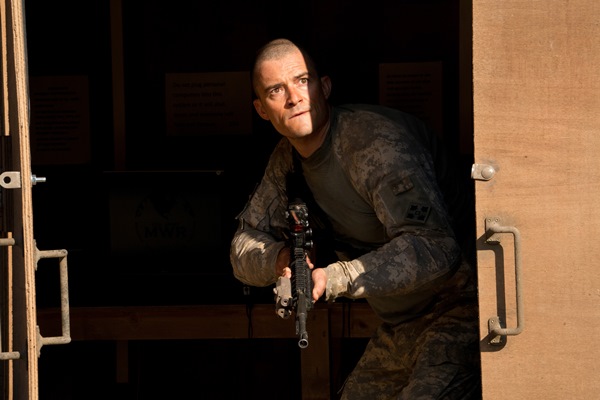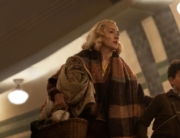
Based on Jake Tapper’s best-selling nonfiction book, The Outpost takes us back to 2006. The U.S. Army is stationed in a remote valley in Afghanistan, surrounded by the Hindu Kush mountains. PRT Kamdesh is one of many such outposts, created in hopes of promoting counterinsurgency with the locals and halting the stream of weapons coming in from the Taliban in Pakistan. The soldiers are a mix of the bigoted, frightened, and idealistic. The locals are suspicious; it’s unclear who they are to fear more, the U.S. Army or the Taliban. The imposing mountains rise up and surround the soldiers. Bullets come at them seemingly from nowhere. The operation is doomed.
The film follows the travails of the soldiers as they struggle with the impossibility of their task. Director Rod Lurie emphasizes the terrain that traps them, and creates an uneasy atmosphere in which we are certain violence will erupt, even if we don’t know when. Captains come and go, some die, others are posted elsewhere. The precariousness of the mission results in the Battle of Kamdesh, which is long, bloody, and well rendered, and forces the troops to evacuate.
The film has a rich and varied cast that sometimes transcends the tough-talking masculinity we expect from war films. The standouts are Orlando Bloom as Lt. Benjamin Keating and Caleb Landry Jones as Sgt. Ty Carter. Both are cast against type: Bloom is an idealistic Southerner, and Jones plays an insecure, frightened soldier who is prophetically aware of the senselessness of the U.S. presence in the region.
All of the characters are sharply defined. The screenplay goes out of its way to give them depth, family ties, rapport with one another. However, I could not help but think of last year’s Combat Obscura. The comparison may be unfair: The Outpost is a fictional dramatization of real events, whereas Combat Obscura is a documentary cobbled together from footage of soldiers in Afghanistan. Nevertheless, Combat Obscura features something we rarely see on film, a terrifying look at the psyche of a soldier and the awful idiocy of war.
The Outpost aims for something similar and admirably tries to encapsulate the full complexity of the situation (the locals who distrust the soldiers, who struggle to make sense out of a flawed endeavor), but it never fully stops feeling like a feature film set in the mountains. Even though the characters are given enough facets to their personalities that we see them as three-dimensional, the dialogue itself is so plot-driven that it never loses a sense of artificiality.
The Outpost is also somewhat curious in its emphasis. At the end, when the soldiers leave, Lurie emphasizes the honors that the remaining soldiers achieved and that the government did not provide them with adequate resources to accomplish their task. No one would doubt the bravery of these men, but it’s odd that Lurie chose this as a note to end on rather than to question the U.S.’s ongoing occupation in Afghanistan writ large. We see hints of this, but never quite enough. Additionally, this is the kind of story that would benefit enormously if we had the perspectives of non-Western characters, who are present but are seen chiefly through the eyes of the occupying soldiers.
Yet The Outpost is not your average war film, and raises questions as to whether the horrors of the 21st century really are possible to encapsulate on film.






Leave A Comment